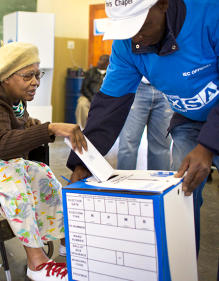|
Getting your Trinity Audio player ready...
|
 Valencia Talane
Valencia Talane
Millions of South Africans voted this week in what was arguably the country’s most exciting election in 20 years – exciting because it provided many different dynamics in terms of politics, media and other social spheres. It certainly was a demanding election for the political parties that participated, with many feeling the campaign pressures for the first time.
For rising above the negative energy that accompanies highly competitive elections, and taking the time to make their all-important mark, we make South Africa’s 2014 voters the heroes of the week.
Voters had some hard decisions to make around this week’s poll. For the first time, there was a high number of people confused over whom to vote for – many of them spoke freely on television and radio talk shows and social media platforms to express their indecisiveness. For the first time in the history of a democratic South Africa there was a formal campaign – the Vote No campaign – calling on people to not vote for a political party, but instead to use the opportunity to spoil their ballots as a form of protest against the government of President Jacob Zuma.
Led by former ministers Ronnie Kasrils and Nozizwe Madlala, the campaign had either succeeded or failed depending on how one looks at it. The Independent Electoral Commission (IEC) had by post-election Friday recorded about 230 000 spoilt ballots. Granted, not all can be deemed intentionally spoilt, with some possibly carrying genuine mistakes. The IEC is not able to distinguish between the Vote No campaign and the accidental errors.
For the several million others who made legitimate marks on their ballot papers it was their once-in-five-years chance to give their party a push to Parliament. The number of seats a party occupies in Parliament is determined by how many votes it gets in the election. This means each voter consciously elects a group of individuals nominated by the party of their choice, to hold the administration accountable to them on their behalf.
In theory, by merely voting, South Africans take part in a process that indirectly puts power in their hands in terms of how the country is to be governed. A recent survey by Media Monitoring Africa (MMA) put corruption at the top of the list of issues that dominated media coverage ahead of the election.
MMA director William Bird said nearly 10% of campaign coverage pertained to corruption in the government. Other dominant topics were party campaigns, party politics, protests, and messages on social media platforms, Business Day reported earlier this week.
A simplistic view would hold that citizens digested the different messages they were getting on the topic of corruption and made their polling choice based on this, among other influences. Nevertheless, those who voted made a conscious effort to speak their mind and support the public representatives they believe have their best interests at heart.


